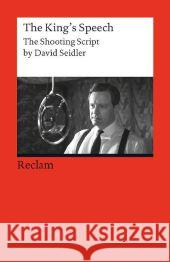The King's Speech : The Shooting Script by David Seidler » książka
The King's Speech : The Shooting Script by David Seidler
ISBN-13: 9783150198353 / Angielski / Miękka / 2012 / 172 str.
Bester Film, beste Regie, bester Hauptdarsteller und bestes Originaldrehbuch bei der Oscarverleihung 2011 wurde "The King's Speech" gleich viermal ausgezeichnet. Das Drehbuch erscheint jetzt bei Reclam. Der britische Thronfolger Prinz Albert (als König Georg VI.) überwindet mit Hilfe des australischen Gelegenheitsschauspielers und Sprachtherapeuten Lionel Logue sein Stottern. Nationalhistorie und privates Schicksal spiegeln sich in einer Weise, die Geschichte lebendig werden lässt. Aus Rücksicht auf Queen Mum, die Witwe Georgs (und Mutter von Elizabeth II.), die 2002 im Alter von 101 Jahren starb, wurde das Drehbuch, an dem David Seidler seit den frühen 1980er Jahren gearbeitet hatte, erst 2009/2010 verfilmt.
One man saved the British Royal Family in the first decades of the 20th century - he wasn't a prime minister or an archbishop of Canterbury. He was an almost unknown, and self-taught, speech therapist named Lionel Logue, whom one newspaper in the 1930s famously dubbed 'The Quack who saved a King'. Logue wasn't a British aristocrat or even an Englishman - he was a commoner and an Australian to boot. Nevertheless it was the outgoing, amiable Logue who single-handedly turned the famously nervous, tongue-tied Duke of York into one of Britain's greatest kings after his brother, Edward VIII, abdicated in 1936 over his love of Mrs Simpson. This is the previously untold story of the remarkable relationship between Logue and the haunted future King George VI, written with Logue's grandson and drawing exclusively from his grandfather Lionel's diaries and archive. It throws an extraordinary light on the intimacy of the two men, and the vital role the King's wife, the late Queen Elizabeth, the Queen Mother, played in bringing them together to save her husband's reputation and reign. The King's Speech: How One Man Saved the British Monarchy is an astonishing insight into a private world. Logue's diaries also reveal, for the first time, the torment the future King suffered at the hands of his father George V because of his stammer. Never before has there been such a personal portrait of the British monarchy - at a time of its greatest crisis - seen through the eyes of an Australian commoner who was proud to serve, and save, his King.











